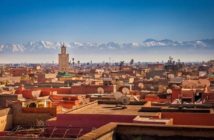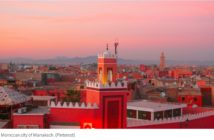Architectural Digest
Stefanie Waldek
Morocco is a country of delicious sights, from elaborately tiled walls to colorful goods sold in souks to lush gardens that defy the desert climate. Of that last category, one of the most dazzling is the world-famous Rohuna, cultivated by Italian writer and horticulturist Umberto Pasti in the countryside overlooking the Atlantic some 40 miles south of Tangier. The oasis is the subject of the new book Eden Revisited: A Garden in Northern Morocco ($55, Rizzoli), penned by Pasti himself and photographed by Ngoc Minh Ngo, a frequent visitor to the garden whose work has been featured in Architectural Digest.
“There was a fig tree. I sat down in its shade and fell asleep,” writes Pasti of his first visit to the region in the introduction of the book. “I dreamt that this place was my body and my body was a garden. When I woke up I was flower beds and stairs and terraces. There was turf where my hair had been. I had turned into a garden that had already been there once, who knows when. . . . I had no time to lose.”See the video.
That was more than 20 years ago, and Pasti indeed wasted no time in getting to work planting. Today, Pasti has 25 acres of his own paradise, a good portion of which is dedicated to indigenous flora. With his team of local gardeners, he has transplanted greenery salvaged from construction sites to his property, where it thrives for the majority of the year (it disappears during the hot summers). But Pasti has also created the Garden of Consolation, a collection of rooms, terraces, and outdoor plots that are watered year-round to maintain the blooms. The result is not only a snapshot of the diverse landscapes of Morocco, but also a glimpse into the mind of Pasti.
Here, we dive into the pages of Eden Revisited to take a closer look at Pasti’s beloved Rohuna.





Originally Appeared on Architectural Digest







